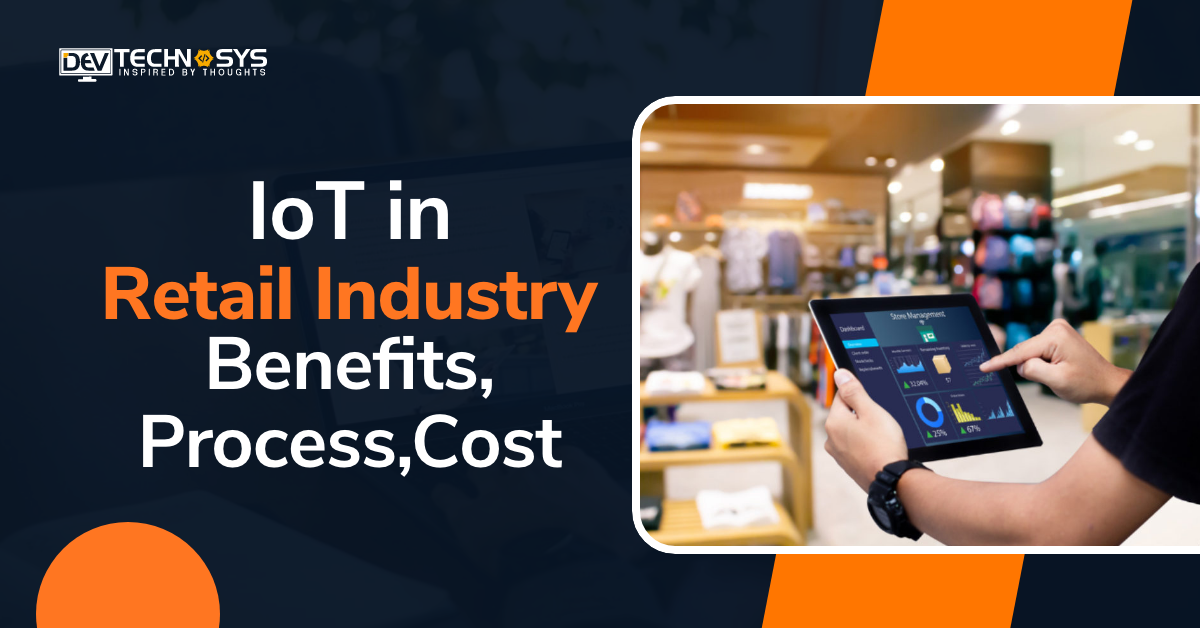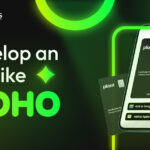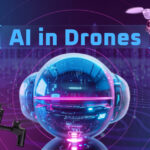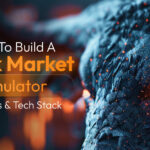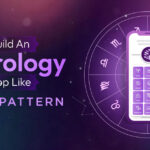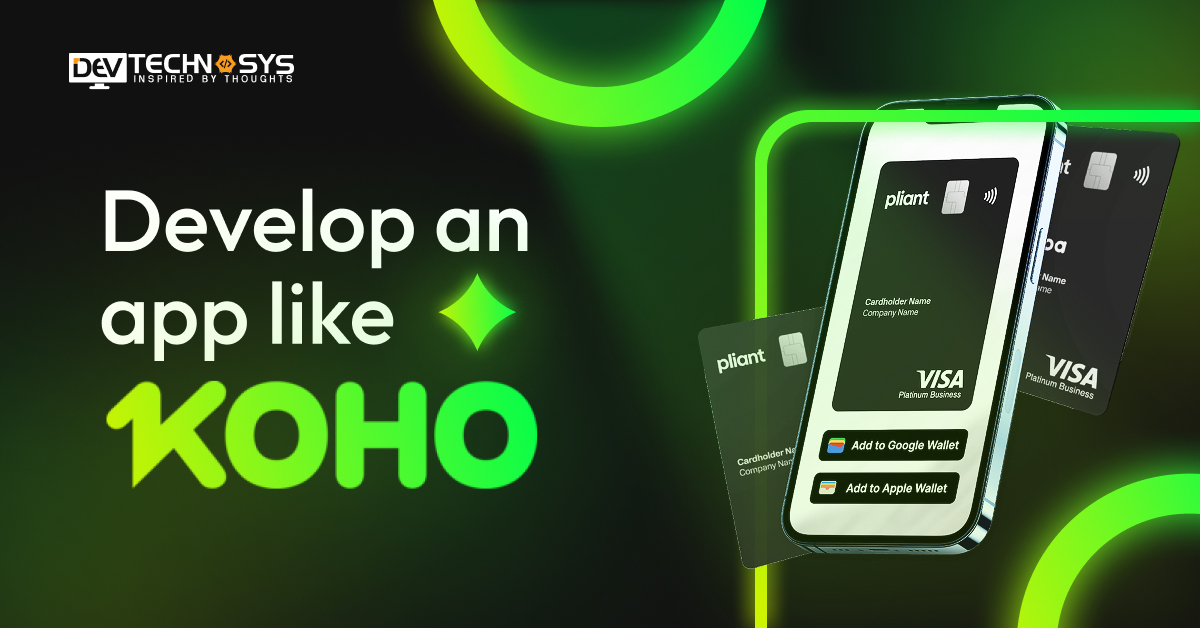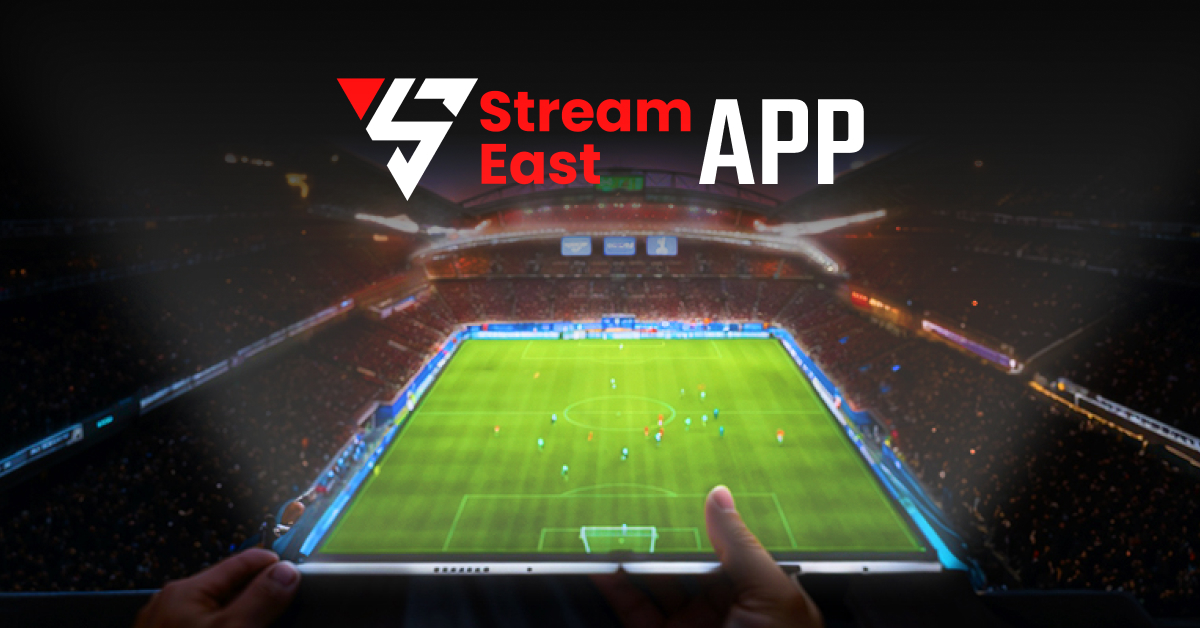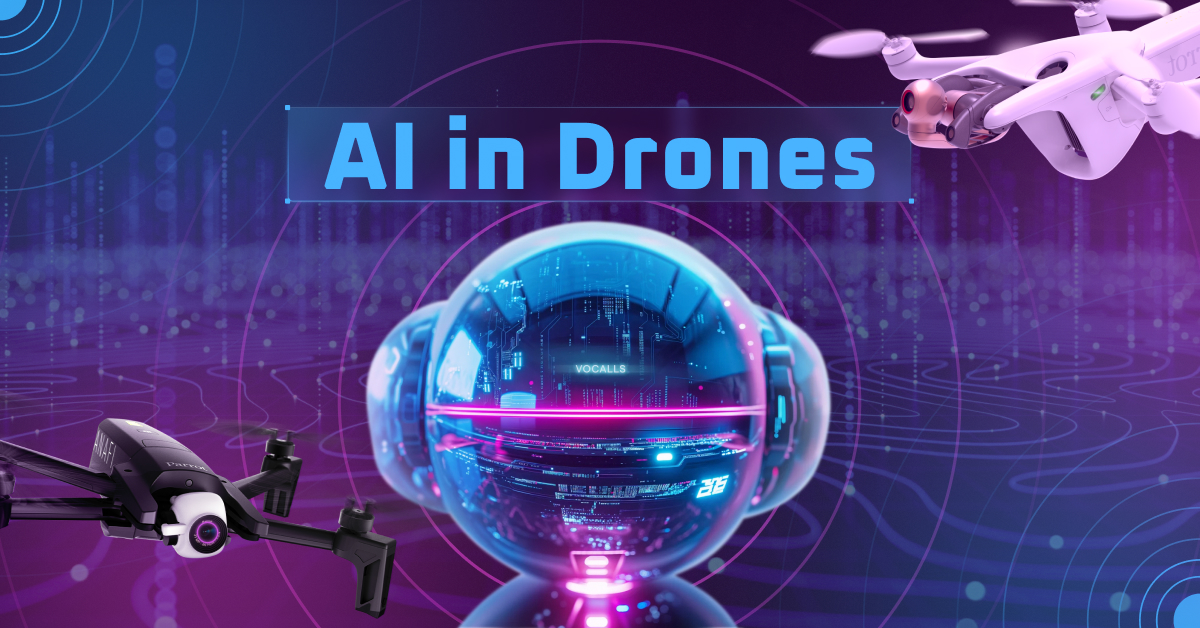What if customers walk into the store where the shelves talk with them, fitting rooms know their size, and your checkout counter has vanished? So, welcome to the future of shopping, where the Internet of Things (IoT) manages all aspects successfully.
As an author, I got a chance to write about IoT in retail industry. For this, I Reached an IT company, where I saw how the IoT and retail industry are connected with each other. IoT has become a significant aspect of retail business. There, I learned that the move from the old system to a more dynamic, data-driven network has become a huge opportunity for retail businesses.
So, if you are in the retail business and looking to develop IoT solutions for your businesses, you have reached the proper place. This blog will clear all your doubts and provide necessary information about IoT in retail industry using relevant case studies and examples.
What Is the Internet of Things (IoT) in Retail Industry?
IoT is a collective network of connected devices and technology that facilitates effectvie communication between the cloud and devices and between the devices themselves.
The IoT in retail industry deploys networks of interconnected devices and sensors to accelerate retail business growth. Retail IoT networks are powered by specialized software that gathers, processes, and manages data.
If any retail business wants an IoT system at its workplace, it should consult with an IoT application development company. Professionals have experience finding the best IoT solutions for different industries, ensuring business growth.
Current Market Stats of IoT in Retail Industry
- The IoT market is predicted to grow significantly in revenue, reaching a stunning US$1,387.00billion by 2024 worldwide.
- Among the numerous segments, Automotive IoT is expected to dominate the industry, with a significant market volume of US$494.20 billion in the same year.
- The market is expected to increase at a 12.57% annually (CAGR 2024-2028), resulting in a stunning market volume of US$2,227.00 billion by 2028.
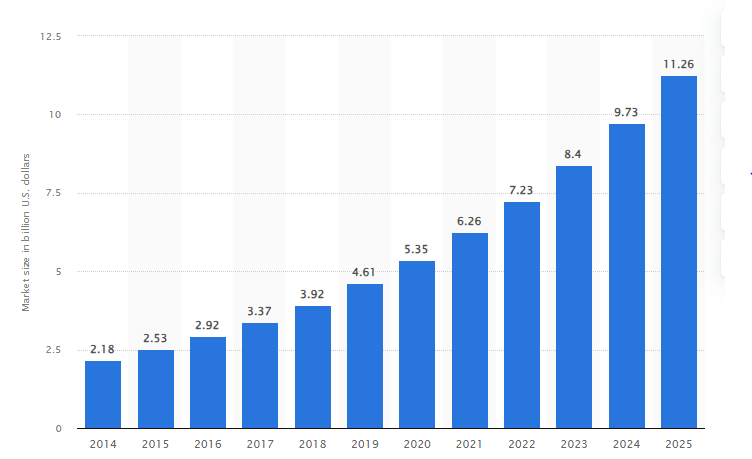
Source: Statista
The statistics depict the size of Internet of Things (IoT) hardware such as wearables, sensors, RFID tags, and beacons in the US retail market from 2014 to 2025. In 2015, the retail market for IoT hardware was worth 2.53 billion dollars in the United States.
Why Should Businesses Invest in IoT Solution in Retail Businesses?
IoT in retail industry is gaining massive popularity for numerous compelling reasons. Technology and IoT app development solutions help create new business models, optimize processes, analyze consumer behavior, and more. Hence, if you want to know the power of Iot, look at the following benefits of implementing Internet of Things in retail industry:
- Enhanced Customer Experience
- Streamlined Inventory Management
- Theft Prevention and Security
- Predictive Maintenance
- Data-driven Insights
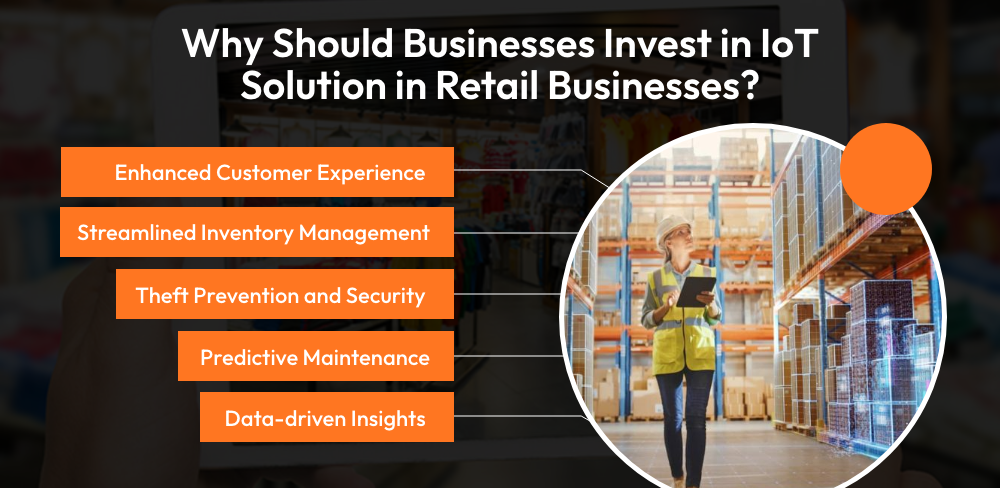
1. Enhanced Customer Experience
Machine learning algorithms and IoT capabilities can effectively assess customer data and personalized shopping experiences. The IoT-integrated system helps with personalized shopping by sending notifications about seamless offers and special mobile discounts based on the shopper’s location proximity.
2. Streamlined Inventory Management
With the best inventory management software, retail businesses can efficiently trace their products even after they have been sold. Sensors or smart tags can collect real-time data about a product’s condition, usage, and location, ensuring better inventory traceability.
3. Theft Prevention and Security
In retail, IoT security systems with sensors and cameras control theft while improving overall store security. Its real-time monitoring feature allows businesses to respond more quickly to minimize losses. It also features automated access control to restrict entry to unauthorized areas.
4. Predictive Maintenance
IoT sensors can monitor equipment health and estimate potential risks or failures before they occur, which can create a big challenge for the business. Hence, as per enterprise product development services provider this proactive approach to maintenance helps businesses to prevent expensive downtime and disruptions.
5. Data-driven Insights
IoT sensors help collect valuable data based on customer behavior. By examining the collected data, businesses can gain insights into their burying patterns and product demand. Hence, this empowers them to optimize store layout and marketing strategies so that customers can stay engaged and increase sales.
5 Key Steps To Develop IoT in Retail Industry
Generally, the development process of all the apps is the same. However, if you want to Create shopping app for your Ecommerce business or IoT for business operations, you should carefully bring something new into your app development process. If actually want to stand out in the market, consider the following steps carefully without any doubt:
- Extensive Market Research
- Make UI/UX Design
- App Development
- Testing and Quality Assurance
- Deployment and maintenance
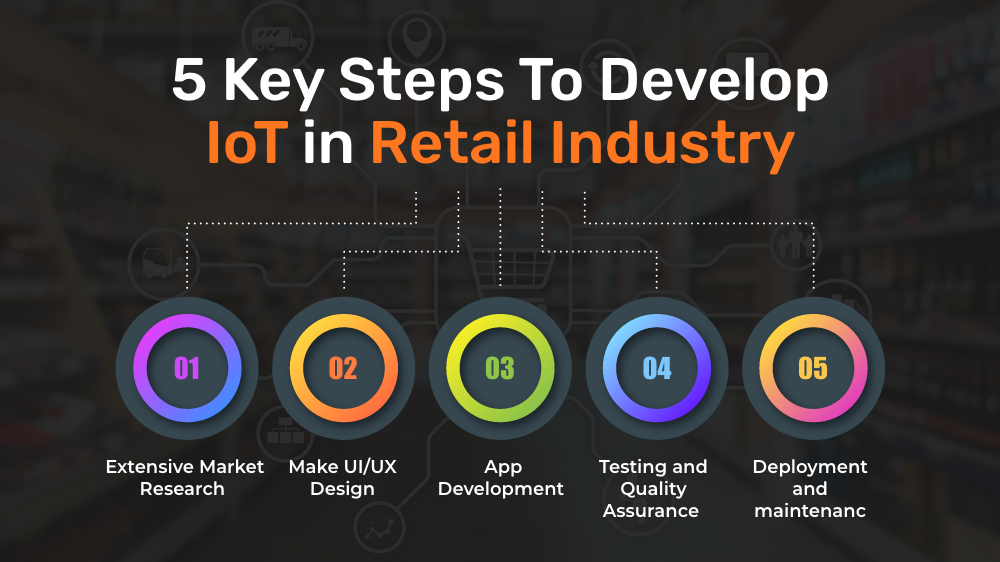
1. Extensive Market Research
As you develop an IoT-based app for your retail business, find the areas in your retail journey that can benefit most from the IoT. Also, market research should be conducted to understand customer pain points and how competitors play well in the market. Hence, it will help you know why you need to build and integrate it for the retail industry.
2. Make UI/UX Design
Try greeting customers by presenting personalized recommendations on a digital display. This shows how critical the user interface and user experience are in designing IoT retail.
You can hire ecommerce website developers who can create engaging and intuitive user journeys. Additionally, you are advised to consider factors such as interactive Kiosks and mobile app interfaces.
3. App Development
Now, the phase of your IoT app development comes. Here, your application acts as the brain of your IoT ecosystem, triggering actions, processing sensor data, and providing valuable insights.
Remember that a robust app is critical for seamless operation. Whether it’s about managing inventory levels and sending targeted promotions based on customer location, a robot app is helpful.
4. Testing and Quality Assurance
Before introducing your internet of things retail to the world, conduct various tests to ensure that your app is ready to use. Invest in quality assurance to make your IoT system function flawlessly.
You can also get assistance from an IoT mobile app development services provider for better outcomes, as a single point of failure can impact user experience and damage your brand reputation.
5. Deployment and Maintenance
After a successful testing process, you can now launch your IoT solution. However, the journey is continuing. You have to regularly monitor its performance and collect user feedback based on its performance.
If required, you are responsible for making the necessary changes or improvements so that users can stay engaged with your IoT or on demand app development solutions. It will also help to remain competitive in the digital landscape.
How Much Does IoT App Development Cost in the Retail Industry?
IoT app development costs can range from $9000 to $28000. However, the cost can vary widely depending on factors, including the app’s features, the hardware used, the development team, and its complexity.
To understand different IoT app development costs based on the level of complexity, look at the table below:
IoT App Development |
Estimated Cost |
Time Frame |
| Simple IoT App Development | $9000 – $14000 | 3 to 6 Month |
| Medium-Complex IoT App Development | $14000 – $22000 | 6 to 9 Month |
| High-Complex IoT App Development | $28000+ | 10+ Month |
Be clear that it’s just an ideal cost to develop a mobile app. To know the exact IoT-integrated solution development cost, consult experts who can guide you and help prepare a budget according to your project’s requirements.
Know the Cost To Maintain IoT in Retail Industry
The cost to maintain IoT in retail industry requires many things, such as hardware maintenance, cloud infrastructure, data storage, software updates, and security measures. Hence, the overall maintenance cost reaches 15% to 20% of the total retail app development cost.
When maintaining it in retail stores, you also need to consider other expenses for software updates, ongoing support, and training staff to stay updated with the latest trends and technology in the industry.
Essential Features of Iot in Retail Industry
As you know, the IoT is changing the whole retail industry by enabling a connected and efficient shopping experience. However, it also brings tough competition for businesses engaged in the industry.
Hence, according to IoT software development services provider to stay competitive in such a competitive market, consider the features mentioned below:
- Sensor-based Security
- Smart Fitting Rooms
- Robotics
- Connected Packaging
- Security
- Wearable devices for staff
- Artificial Intelligence
- Augmented Reality
- Location-based Services
- Predictive Maintenance
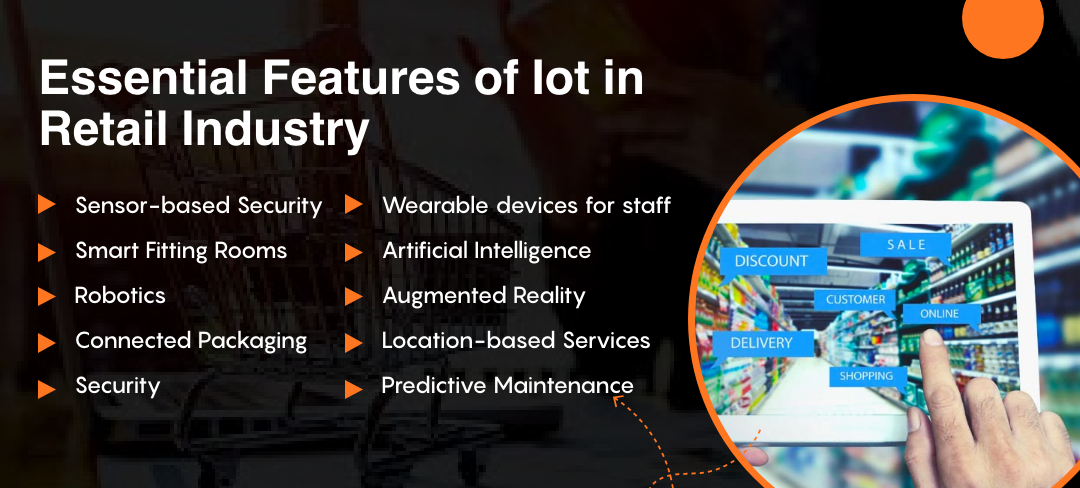
1. Sensor-based Security
Ensure that your IoT-integrated system is capable of preventing theft through real-time monitoring.
2. Smart Fitting Rooms
Build an IoT app that offers personalized recommendations and enables a virtual try-in experience.
3. Robotics
IoT increases operational efficiency by automating tasks like inventory management and product delivery.
4. Connected Packaging
IoT applications in retail industry allow tracking of product locations and provide targeted marketing after purchase.
5. Security
IoT sensors and cameras enhance store security by monitoring for unauthorized access or theft. To insert this feature, take assistance from a retail app development company.
6. Wearable Devices For Staff
IoT wearable help staff perform tasks effectively and stay connected, ensuring better coordination.
7. Artificial Intelligence
This feature includes personalized product recommendations, optimizing pricing, and improving customer services through chatbots.
8. Augmented Reality
It also allows customers to visualize the product virtually in their homes or try it on clothing. However, it may increase the IoT or ecommerce app development cost.
9. Location-based Services
IoT sensors provide personalized promotions and information based on customers’ store locations.
10. Predictive Maintenance
IoT devices at the workplace monitor equipment conditions that enable predictive maintenance and reduce downtime.
Case Study of Successful IoT Implementation in the Retail Industry
If you want to properly understand the use of IoT in retail industry, go through this case study. It will help clarify how to use IoT in your retail business if facing such a situation.
Amazon is known as one of the best leaders in online retail business. The company has integrated IoT solutions into its retail management as it wants to tackle problems related to its checkouts. Because of checkout issues, customers switched to other stores, which impacted Amazon very badly.
After this, Amazon launched an automated physical store called “Amazon Go,” which makes its checkout more efficient. The company decided to use IoT retail management to avoid checkout.
For this, they use a camera system, mobile app, and artificial intelligence that make it convenient for people to make purchases. The device can read the product labels as they are added to the cart and then complete the purchase through a mobile app.
Role of IoT in Retail Industry
Do you know about the Impact of IoT in retail industry to a large extent? Well, it has been seen that IoT has revolutionized the way the retail sector operates. If you are curious to know how IoT is playing a critical role in the retail industry, look here:
- Personalized Product Recommendations
- Interactive Fitting Rooms
- Environmental Monitoring for Perishables
- Optimized Supply Chain Visibility
- Smart Workforce Management
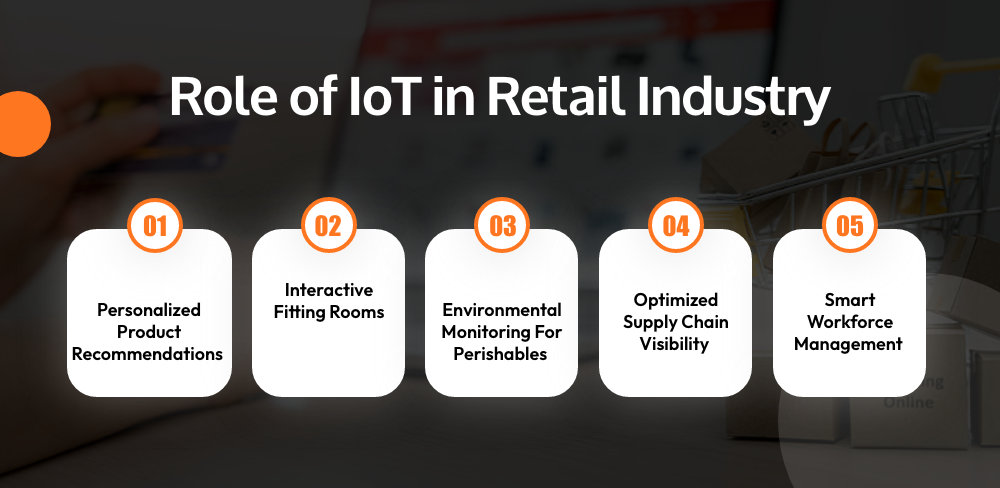
1. Personalized Product Recommendations
RFID-enabled shelves can track customers’ interaction with particular products. Hence, this data and loyalty program information enables businesses to deliver tailored recommendations and promos through mobile apps or store displays, potentially tripling the conversation rate.
2. Interactive Fitting Rooms
An IoT-integrated mirror in the fitting room displays product information and provides a virtual try-on experience. As per mobile app development services provider, it increases customer engagement and satisfaction, resulting in a more delightful buying experience.
3. Environmental Monitoring for Perishables
IoT sensors in freezers and refrigerators detect temperature and humidity fluctuations. This is used for preventive maintenance, helps prevent the rotting of fresh perishables, and reduces food waste. It’s basically the future of IoT monitoring that makes things run smoother.
4. Optimized Supply Chain Visibility
Businesses can enjoy real-time location tracking by placing IoT or retail app development solutions in shipping containers. This allows merchants to identify hurdles, improve delivery routes, and ensure timely product availability, saving time.
5. Smart Workforce Management
With wearable devices, staff can track foot traffic patterns and identify the requirement for additional workforce. As per POS app development company, this real-time data enables businesses to optimize schedules, ensuring efficient customer services during peak hours.
Future Trends and Innovations in IoT for Retail Industry
Future IoT trends and innovation have the potential to change how retail businesses interact with their customers and operate their business activities in such an evolving industry. The rising collaboration between the ecommerce web development company and merchants to incorporate IoT technologies into online platforms is one of the significant trends.
This partnership enables retail businesses to offer personalized recommendations and streamline the buying procedures. Apart from this, it also empowers retail business to optimize inventory management and enhance operational efficiency that drive business growth.
Similarly the role of IoT IoT app development companies has become very significant in driving the retail industry. Such retail app development services providers specializing in creating custom IoT apps tailored to diverse requirements of retailers that enable them to improve overall operational efficiency.
Furthemore IoT app Dvelopments companies foster innovation by developing tailored solutions, optimizing inventory and enhancing customer experience that ensure business success, in the current digital age.
As the retail industry continues to embrace IoT-integrated solutions to stay ahead in market competition, collaboration with the IoT app development company will play a critical role in shaping the future of retail business. It drives growth and delivers value to both customers and businesses alike.
Wrapping Up!
IoT in retail industry has changed the way brands interact with customers. IoT in retail stores has given customers personalized and new ways to shop, making retailers more efficient. As a result, most retail businesses are looking to implement the IoT to improve their business performance.
In this blog, as you have seen, the power and potential of IoT to transform retail operations, you can also grab the opportunity to grow your business. If you want the same, connect with an online shopping app development company without a further second.
You can consider Dev technosys, which helps retail businesses get the best cellular IoT connectivity for their devices or gadgets.
Frequently Asked Questions
1. What Is the Cost to Develop a Shopping App?
On average, the shopping app development cost ranges from $8000 to $27000, but it can vary if the project’s requirements are unique.
2. How Long Does it Take to Build an IoT Solution?
Generally, it takes 4 to 11 months to build an IoT solution. The development time can also differ based on the project’s requirements.
3. What Are Some Emerging Trends of IoT in Retail Industry?
The retail industry is witnessing a range of emerging trends in IoT, such as enhanced supply chain management, personalized shopping experiences, and real-time tracking.
4. How Much Does It Cost to Hire Mobile App Developers to Integrate IoT in Retail Industry?
If you want to hire mobile app developers to integrate IoT into your business, a developer will charge around $15 to$25 hourly.
